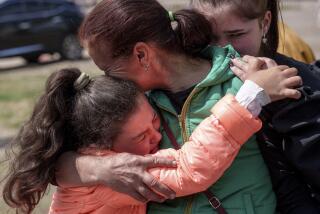Gates sees chance to vary Iraqi Cabinet
- Share via
AMMAN, JORDAN — The resignation of six allies of radical Shiite Muslim cleric Muqtada Sadr from the Iraqi Cabinet could provide an opportunity for the ruling Shiite coalition to diversify its government, Defense Secretary Robert M. Gates said Tuesday.
Some critics of the government have suggested that Prime Minister Nouri Maliki, a Shiite, should bring more Sunni Muslim legislators into his Cabinet as a goodwill gesture. And Gates said he would like to see Maliki use the new vacancies to jump-start the reconciliation process among Sunni Arabs, Shiites and Kurds.
“The impact these resignations have will depend in some measure on who is selected to replace these ministers and their capabilities and whether the vacancies are used in a way that can further advance the reconciliation process,” Gates said at a news conference in Amman, the Jordanian capital. “There is the opportunity to turn what might be a negative into a positive.”
Maliki said Tuesday that he would fill the vacant ministries soon with independent technocrats, and said the resignations provided an opportunity to “escape from quotas” based upon sect and ethnicity.
The prime minister also brushed off concerns that his fragile coalition government was losing support from some of the political partners that helped bring him to power.
“The withdrawal does not mean the government is witnessing weakness,” Maliki told reporters after a Cabinet meeting in Baghdad.
Gates said he did not yet know the full meaning of the Sadr loyalists’ actions. Donald H. Rumsfeld, Gates’ predecessor as Pentagon chief, might have described Sadr’s motivations as a “known unknown” or even as an “unknown unknown.” But Gates, a former CIA director, turned to the language of his old profession.
‘Secrets and mysteries’
“In the intelligence business, we divided all of the information we wanted to know into two categories: secrets and mysteries,” Gates said. “I think that [Sadr’s] motives, at least for me, are a mystery, not a secret.”
As the United States has stepped up its military operations in Baghdad, Sadr’s Al Mahdi militia has reduced its activity. Some military officers view the militia’s decision to “go to ground” as one of the first successes of the American troop buildup, which began in mid-February.
Gates is visiting the Middle East this week in an attempt to build support for the Maliki government among other Arab countries. He met Tuesday with King Abdullah II, the ruler of Jordan, and said most of the discussion focused on Iraq. The Defense secretary is hoping the Jordanian and Egyptian governments can pressure Maliki and leaders of Iraq’s Sunni minority to advance the reconciliation process.
The Iraqi government, dominated by Shiite political parties, has yet to reform laws that forced many Sunnis from government jobs. It has also failed to hold provincial elections that could give Sunni-dominated regions a measure of local power, and has not approved a law that would lay out how oil revenue should be shared among the country’s ethnic and sectarian groups. The failure to move on those reforms has angered Sunnis inside and outside Iraq.
Violence continued around the country Tuesday, as roadside bombs, executions and gun battles left at least 18 people dead and 13 wounded. An additional 25 unidentified bodies were discovered nationwide, presumed to be victims of sectarian violence.
Oil-rich city’s tensions
The northern Iraqi cities of Kirkuk and Mosul bore the brunt of the violence. Tensions in the oil-rich city of Kirkuk have been rising as the Iraqi government attempts to resolve disputes between Sunni Arabs and Kurds, who are fighting over who will control the region and its wealth.
On Tuesday, a car bomb targeting a gas station southeast of the city killed three civilians and injured four others, including a policeman, a Kirkuk police official said.
Late Monday night, a barber was killed and one of his patrons injured when gunmen opened fire on the hair salon before speeding away in a car.
Police officials say Muslim fundamentalists in the city have launched at least seven similar attacks this month, issuing warnings to barbers who cut men’s hair in Western styles or shave beards in a manner the militants consider irreligious.
In Mosul, a suicide truck bomber attacked an Iraqi army outpost, but troops opened fire and the bomb detonated prematurely, killing one civilian and injuring five, said Iraqi police Brig. Gen. Muhammed Wagaa.
In another attack, a high-ranking police official, Col. Mohammed Ibrahim Jaboori, and his son were gunned down near their Mosul home.
U.S. military officials said Tuesday that Marine Lance Cpl. Daniel R. Scherry, 20, of Rocky River, Ohio, died Monday in a “nonhostile incident during combat patrol” in the western province of Al Anbar.
His death brought to 3,311 the number of American military fatalities in the Iraq theater since the U.S.-led invasion in 2003, according to the website icasualties.org.
Separately, U.S. officials said Tuesday that three Iraqis killed the day before by U.S. forces during a raid in Ramadi were not police officers, as originally reported by the American military. A preliminary investigation of the incident suggested that the gunmen used a car that resembled local Iraqi police vehicles, according to a military statement.
*
edmund.sanders@latimes.com
Barnes reported from Amman and Sanders from Baghdad. Ruaa Al-Zarary in Mosul and a special correspondent in Kirkuk contributed to this report.
More to Read
Sign up for Essential California
The most important California stories and recommendations in your inbox every morning.
You may occasionally receive promotional content from the Los Angeles Times.













